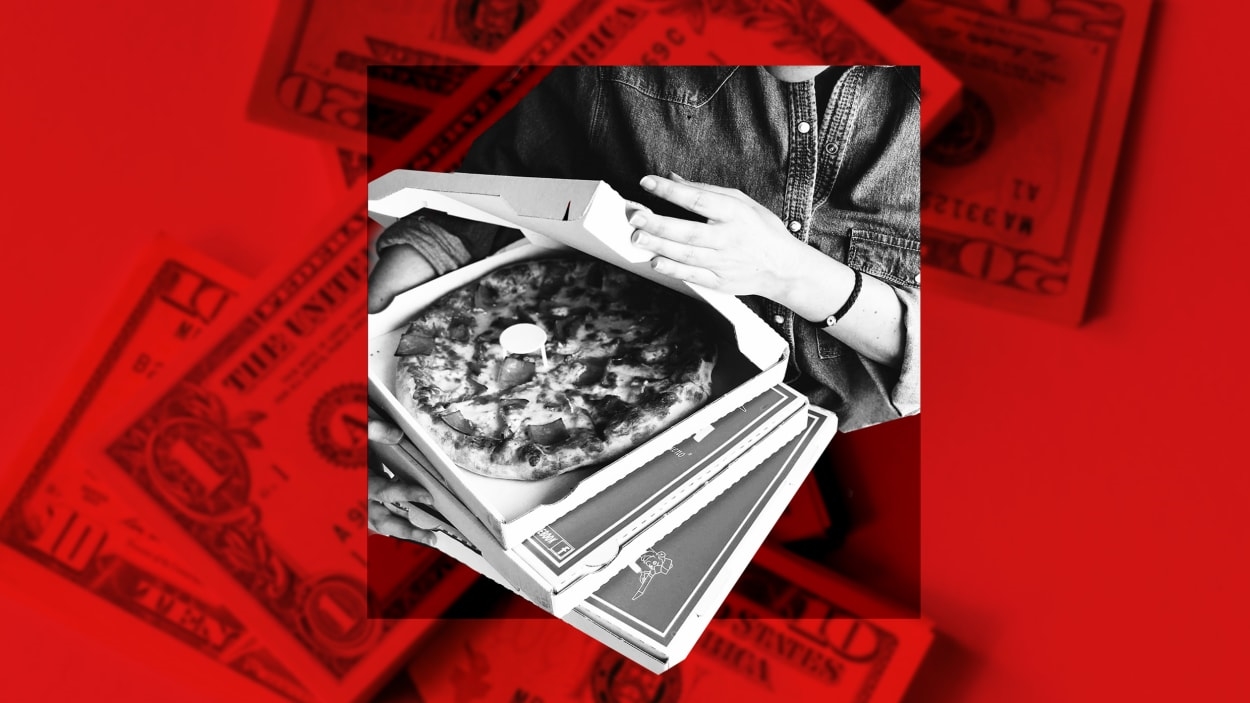
Earlier this week, Lacey Purciful, a 38-year-old homeowner in Kempner, Texas, uploaded to TikTok an upsetting interaction captured by her porch security camera. A male delivery worker hands her a pizza, and as he turns to leave, remarks: “I just want to say, it’s a nice house for a $5 tip.”
Surprised, Purciful responds, “You’re welcome.” To which the the worker snaps, “F*** you,” as he walks away.
After the 28-second clip racked up millions of views, thousands of comments, and national media attention, DoorDash gave Purciful $80 in delivery credit and deactivated the worker, who has only been identified as “Corey,” from its platform. “To be clear—respectfully asking for a tip is acceptable, but abusing or harassing someone is never acceptable,” the company said in a statement.
But since posting the video, Purciful says that she’s received comments from other DoorDash workers—whom the company calls “Dashers”—who have explained that they often depend on customer tips to make a living wage. “I never knew how screwed up it really is,” she tells Fast Company.
One of the people who reshared the TikTok was Gustavo Ajche, a New York City DoorDash delivery worker who tells Fast Company that stories like Purciful’s are “happening every day in New York, too.” Workers can effectively lose money on some deliveries if the tips aren’t high enough, and that feels especially devastating if it happens at a nice residence, he says.
Purciful still thinks Corey’s behavior was unacceptable, but as a former service worker, she can at least empathize with him. “Was he having a bad day? Because if he had been working already eight hours and still hasn’t made minimum wage, I would be highly upset, too,” she says.
Purciful was surprised to learn after posting her video that DoorDash workers are not classified as employees but independent contractors, which means they’re not subject to minimum wage laws, and excluded from labor protections if they get hurt or lose their jobs. It allows DoorDash to offer its workers as little as $2 base pay per delivery—which means workers aren’t guaranteed to even clear their state’s minimum wage.
Just a few places in the country have minimum wage laws for delivery workers, including New York City, where Ajche recently helped workers win a $17.96 per hour pay floor—“a huge change for delivery workers,” he says. “We’re not going to rely 100% on the tip no more.” But with just days until the law takes effect, DoorDash and other gig companies have sued the city to stop it.
Delivery workers without a minimum wage have spoken out for years about feeling pressured to accept as many orders as they can, even low-paid ones, to avoid being penalized by DoorDash’s algorithm. More recently, DoorDash has offered them an option to get paid by the time they spend working, though not the time they spend waiting. Under this pay scheme, workers aren’t allowed to reject any orders—even those that require long trips or include zero tips.
Purciful says it’s “mind-boggling” that workers are being asked to roll the dice between DoorDash’s pay models, which “shouldn’t even be an option, if you’re taking care of your employees.” As a consumer, she says, it also calls into question the steep monthly fees she’s paying. “Where is the money really going to?” she asks.
In an emailed statement, DoorDash spokesperson Julian Crowley said it was wrong to frame the encounter between Purciful and the worker in terms of tipping or pay. “It’s about holding someone accountable for doing the wrong thing, plain and simple,” he says. “Trying to conflate unrelated issues or extrapolate this isolated incident into something larger overlooks the specifics of this particular case.”
Crowley added that in 2022, its Texas gig workers “made $23 per hour on average while on delivery”—a figure that excludes waiting time between orders, which experts estimate at around half of a typical courier’s workday.
But a recent national survey by the Economic Policy Institute found that 29% of gig workers reported making less than the state minimum wage—which is $7.25 an hour in Texas. And studies by labor economists have estimated that actual gig-worker pay after factoring in waiting time, expenses, and the lack of benefits could be vastly lower than the rates that gig companies claim their workers make—as little as $4.82.
Ken Jacobs, the chair of the UC Berkeley Labor Center and a researcher of gig-worker pay, thinks that DoorDash’s claim of $23 per hour “while on delivery” would likely come out to a much lower actual wage in practice. When you include waiting time, expenses, and the lack of benefits, it’s conceivable that a worker like Corey would’ve made $7.25 or less, he says.
Even compared to other kinds of gig work like rideshare, delivery companies pay workers so little that “drivers are basically surviving on tips,” Jacobs tells Fast Company. “It’s an incredibly exploitative setup for drivers, but it’s also bad for consumers. For the customer, they’re thinking they’ve just given a 25% tip. But for the delivery worker, that $5 may feel like nothing.”
The low and unpredictable pay allows platforms to manipulate workers, argues Veena Dubal, a labor law professor at the University of California Irvine, who in a recent paper called the process “algorithmic wage discrimination.” “A worker who is working for a company like DoorDash or Uber Eats is making different amounts from hour to hour, even if they’re doing the exact same work, in the exact same way, with the exact same skill,” she says. For companies, “it helps to get workers to behave in ways that they want them to behave, to keep workers laboring for longer and harder, for very little.”
Delivery workers end up experiencing app work as “a form of gambling,” Dubal adds. “But I think as the woman who gave the $5 tip learned, the takeaway is that work should not be a gamble.”
(2)







